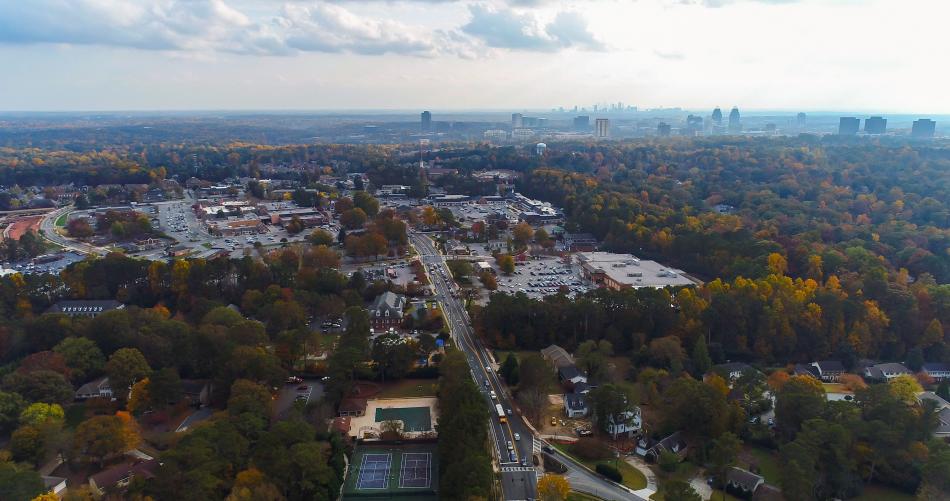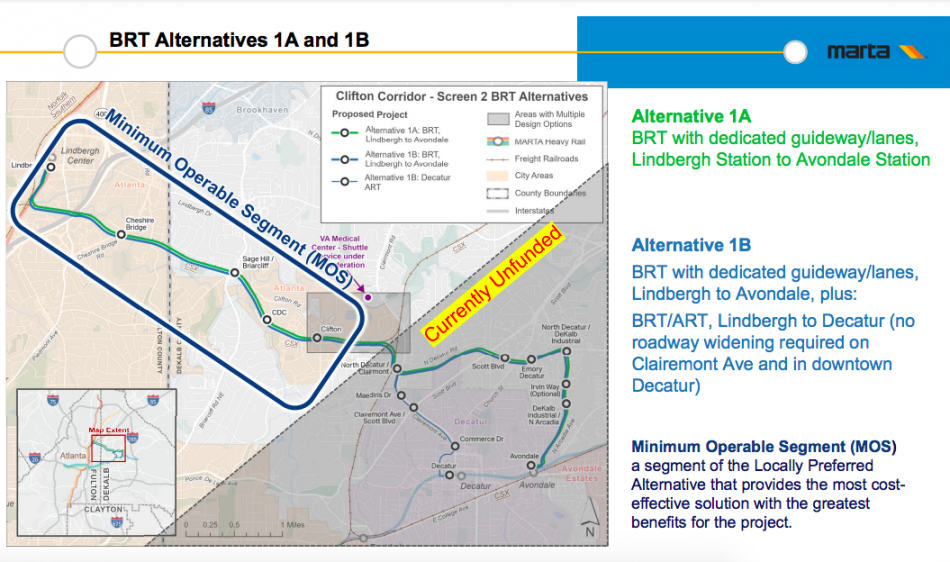NORTHEAST ATLANTA—In news that Atlanta mass transit followers likely saw coming, MARTA has made official its plans to nix the long-held dream that light rail service might be installed along the Clifton Corridor transit line, an 8.4-mile link between Lindbergh and Avondale stations with major job hubs such as Emory University and the Centers for Disease Control and Prevention in between.
Instead, the transit agency—faced with a budget shortfall that’s threatening to cripple some voter-approved More MARTA transit expansion plans—will move forward with another Bus Rapid Transit route that would mainly utilize an existing CSX rail corridor. Whether a secondary BRT line branching to downtown Decatur’s MARTA station via Clairmont Road will also be included remains to be seen, as the AJC reports.
MARTA is making the case in a series of public meetings this week that BRT stretching from Lindbergh to Avondale could be built at less than half the cost (a max of $1.3 billion, versus $2.9 billion for light rail) with far less than half the annual costs in operating expenses. That route could be traveled by BRT buses nearly as quickly as light rail (31 minutes, versus 29), with buses running in dedicated lanes not clogged by public vehicles for 97 percent of it, according to MARTA officials.
Light rail in the Clifton Corridor, which had been a MARTA goal for more than a decade, would have used dedicated lanes for 100 percent of the route. MARTA’s pivot to BRT mimics its switch away from light rail on Campbellton Road and delayed transit plans involving buses in Summerhill.
Two more public meetings for outlining Clifton Corridor plans are on tap for Thursday (virtual) and Saturday (in-person, in Decatur). Details here.
…
DUNWOODY—In a scene that could pass for an article in The Onion skewering NIMBYism, naysaying Dunwoody residents vehemently opposed to the addition of new bicycling infrastructure in the growing DeKalb County city recently turned out in rowdy droves—enough to knock a community forum off track.
 The view over Dunwoody Village, a destination city leaders believe should be better connected with bike and pedestrian infrastructure. Courtesy of City of Dunwoody
The view over Dunwoody Village, a destination city leaders believe should be better connected with bike and pedestrian infrastructure. Courtesy of City of Dunwoody
As led by the PATH Foundation and Dunwoody Mayor Lynn Deutsch, the packed Feb. 8 meeting at Dunwoody City Hall was meant to provide a general blueprint for how and where buffered bike paths and greenways might be installed in coming years, linking with existing trails, parks, and job centers.
But as the Dunwoody Crier relays, the meeting devolved into “mostly angry comments” and “very little real feedback,” with one resident launching “into a monologue on his fears about the project.” The mayor tried to calm the spurned masses but ultimately declared the meeting “unsuccessful,” acknowledging that Dunwoody residents who live in walkable areas now and would utilize enhanced non-vehicle infrastructure were likely too busy to attend a weeknight meeting.
…
SOUTHSIDE—In an effort to pause site-clearing and other development work on Atlanta’s controversial public safety training center, three public officials have filed a complaint in Fulton County—where the 85-acre complex would be located—that calls into question a land-disturbance permit, or LDP, issued for the project.
According to the Saporta Report, Ann Taylor, a member of a project review committee appointed by the Atlanta City Council, filed the appeal against the DeKalb County Zoning Board of Appeals on Feb. 6. Ted Terry, DeKalb County District 6 Commissioner, and environmental organization South River Watershed Alliance have since joined the appeal.
Critics of so-called “Cop City” plans feel the project would unnecessarily destroy one of Atlanta’s last intact forests and waste financial resources.
The appeal filed in Fulton County Superior Court claims DeKalb officials “improperly issued the LDP because the project would violate a state limit on sediment runoff and because its lease gives an inaccurately large number for the amount of greenspace set aside,” as Saporta Report relays. Supporters of the appeal believe it should be heard before site work moves forward.
Meanwhile, efforts to clear the acreage in question by lead developer Atlanta Police Foundation are continuing.
...
Follow us on social media:
• Atlanta leaders report best financial standing in city history (Urbanize Atlanta)







